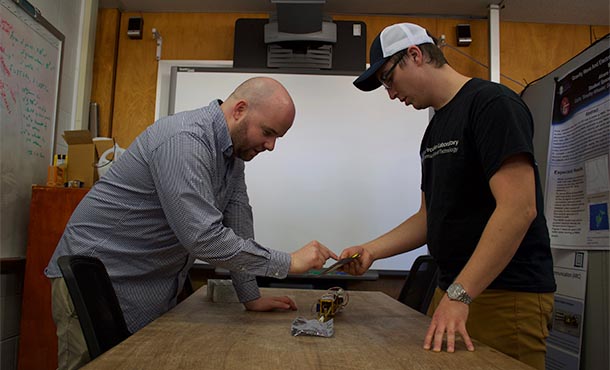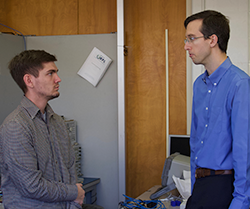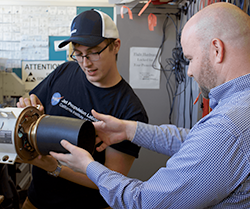
Trey Morris and Evan Ward, researchers with the U.S. Naval Research Laboratory - NRL, recently visited the Penn State College of Engineering in order to initiate a student mentorship program within the college.
U.S. Naval Research Lab, engineering students partner for workforce development
Researchers met with representatives of the Student Space Programs Lab to discuss mentorship, internship and career opportunities
11/27/2018
UNIVERSITY PARK, Pa. — The Naval Center for Space Technology (NCST) at the U.S. Naval Research Laboratory (NRL) in Washington, D.C., recently visited Penn State’s College of Engineering to kick-off a long-term plan for talent development between engineering students and Navy researchers.
Two research engineers from NRL-DC’s NCST, both Penn State Engineering alumni, met with undergraduate and graduate students in electrical engineering, aerospace engineering, computer engineering, and physics who are conducting space missions within the Student Space Program Laboratory (SSPL). The engineers discussed efforts to offer mentorship, student internship opportunities, professional development, and resource and information exchange opportunities.
Although NRL has provided space instrumentation to support SSPL missions in the past, the renewed engagement resulted after Sven Bilén, director of SSPL and professor of engineering design, electrical engineering and aerospace engineering, recently visited NRL-DC in July 2018.
“NRL’s vast institutional knowledge, state-of-the art facilities and capable workforce are a perfect fit for engaging in impactful ways with [Penn State] students,” Bilén said. “SSPL needs experts to provide feedback on student designs and to mentor them on possible space engineering career opportunities, including those within the government that may not be as visible as those in the private space sector.”
Penn State’s SSPL provides undergraduate and graduate students with opportunities to design, build and integrate space systems through hands-on projects which apply classroom knowledge in real-world, interdisciplinary settings.
The visitors — NRL researchers Trey Morris, electronics engineer, and Evan Ward, aerospace engineer — investigated ways to bring real-world space research opportunities to SSPL.
Ward, who received his bachelor of science in aerospace, gave his thoughts on providing research opportunities to his alma mater.
“Working with Penn State and bringing NRL space systems experts to SSPL will offer great intellectual exchange to learn from SSPL’s research and to develop student’s academic skill sets into professional capabilities,” he said. “We want to embed students in our projects to pass down institutional and professional knowledge to the researchers of tomorrow.”
According to Morris, who was part of SSPL as a student pursuing his bachelor of science in aerospace engineering with a minor in engineering entrepreneurship,-NRL and Penn State SSPL’s relationship could translate into collaborative space mission opportunities.
“Finding program funding to collaborate with SSPL for mission support is possible given the level of talent at Penn State,” he said. “There is mutual benefit in working with highly merited students for whom a mentorship can turn into more of an operational exchange.”
About the U.S. Naval Research Laboratory
The U.S. Naval Research Laboratory is a scientific and engineering Navy command dedicated to comprehensive knowledge of the Earth, sea and space to enable Navy and Marine Corps success through science. Based in Washington, D.C., with field sites throughout the United States, NRL employs approximately 2,500 civilian scientists, engineers and support personnel.





